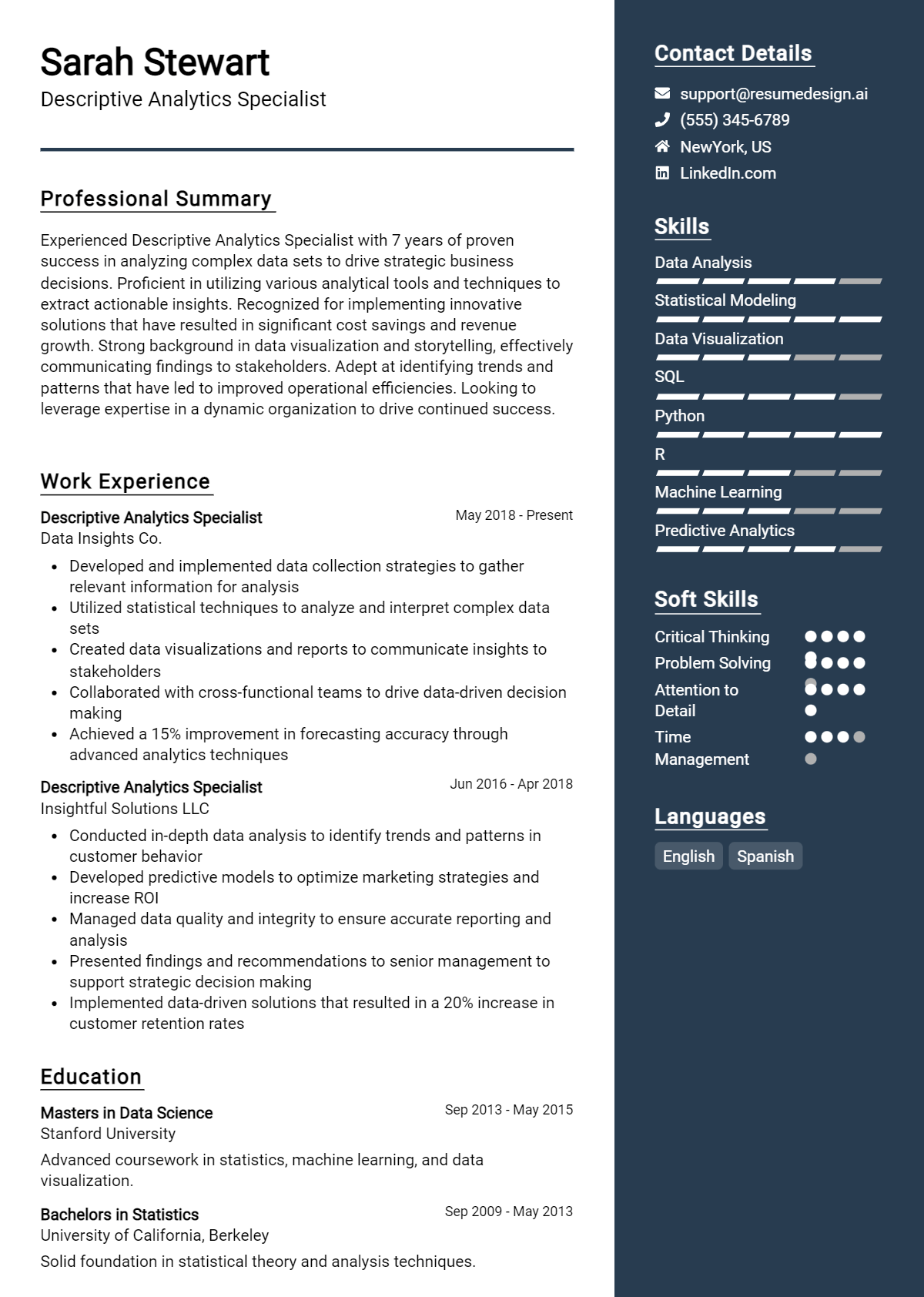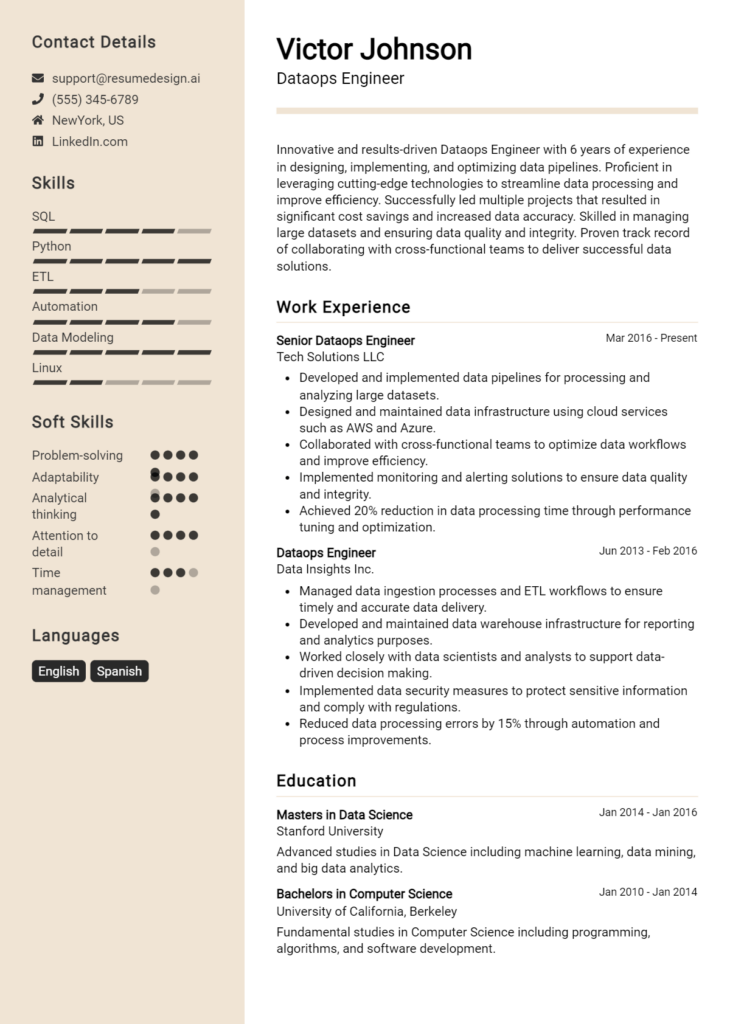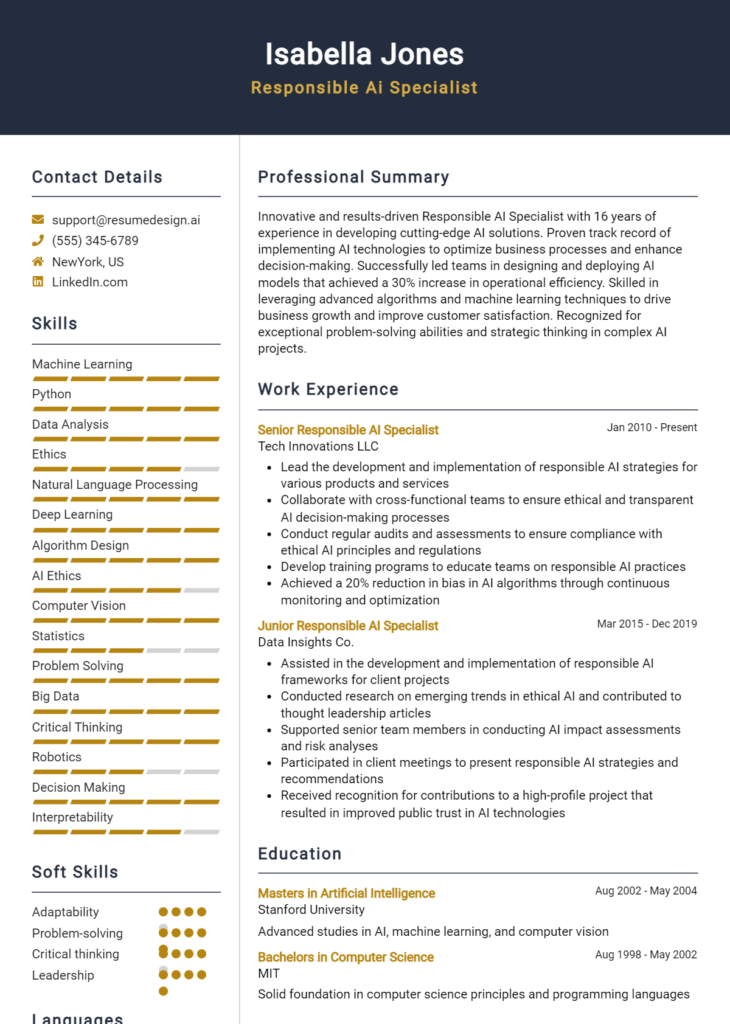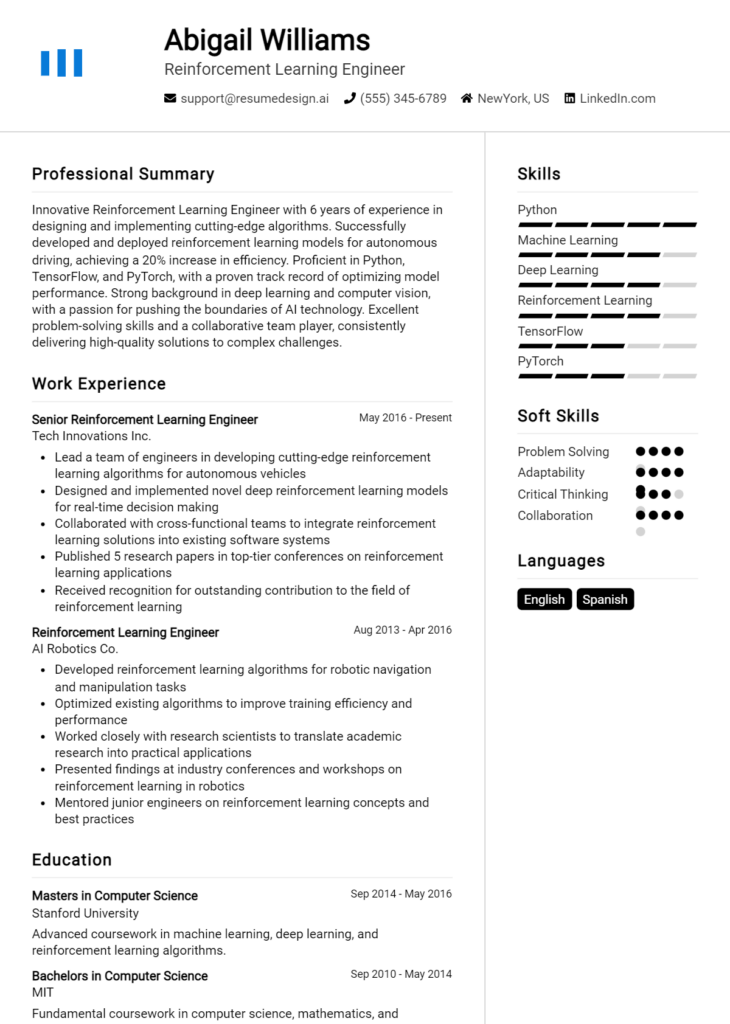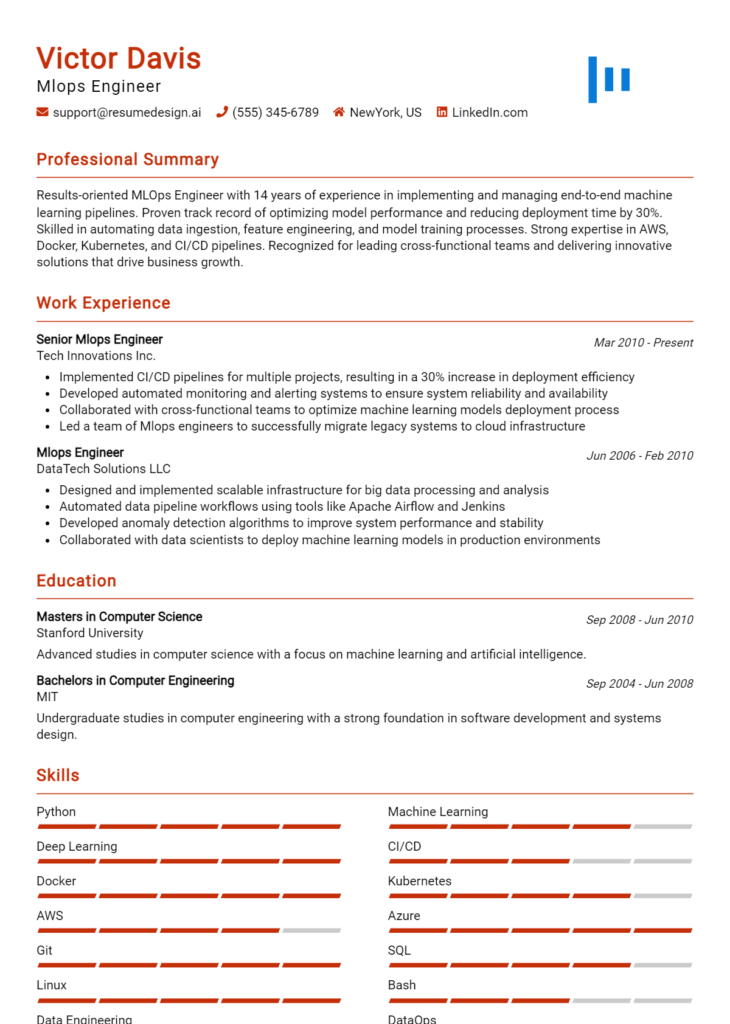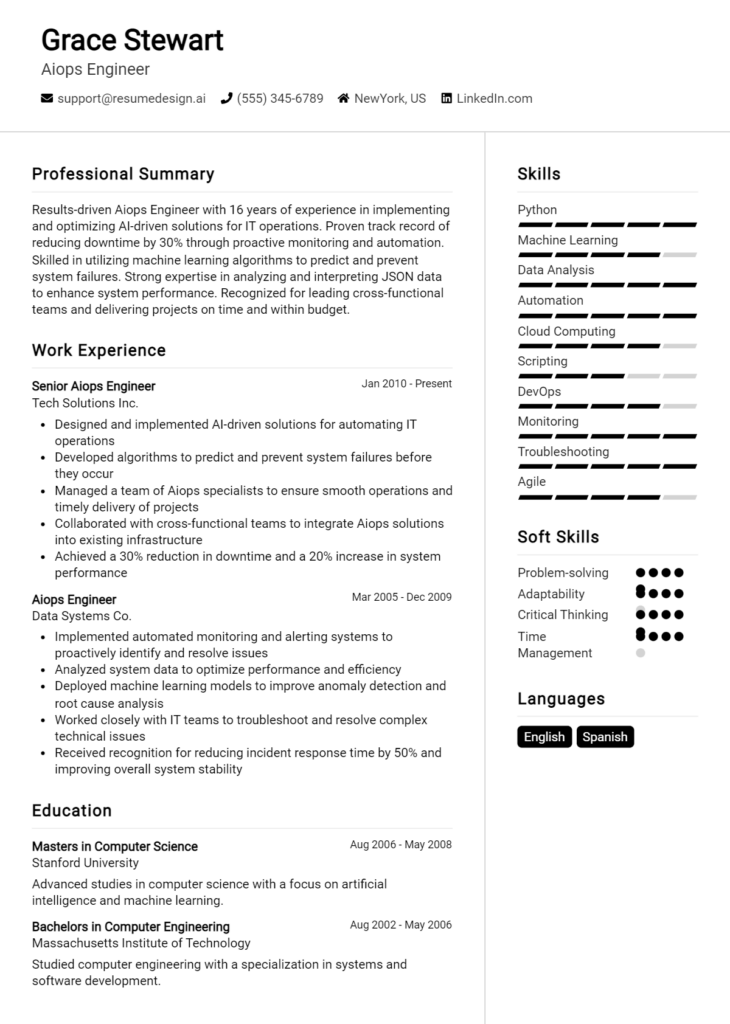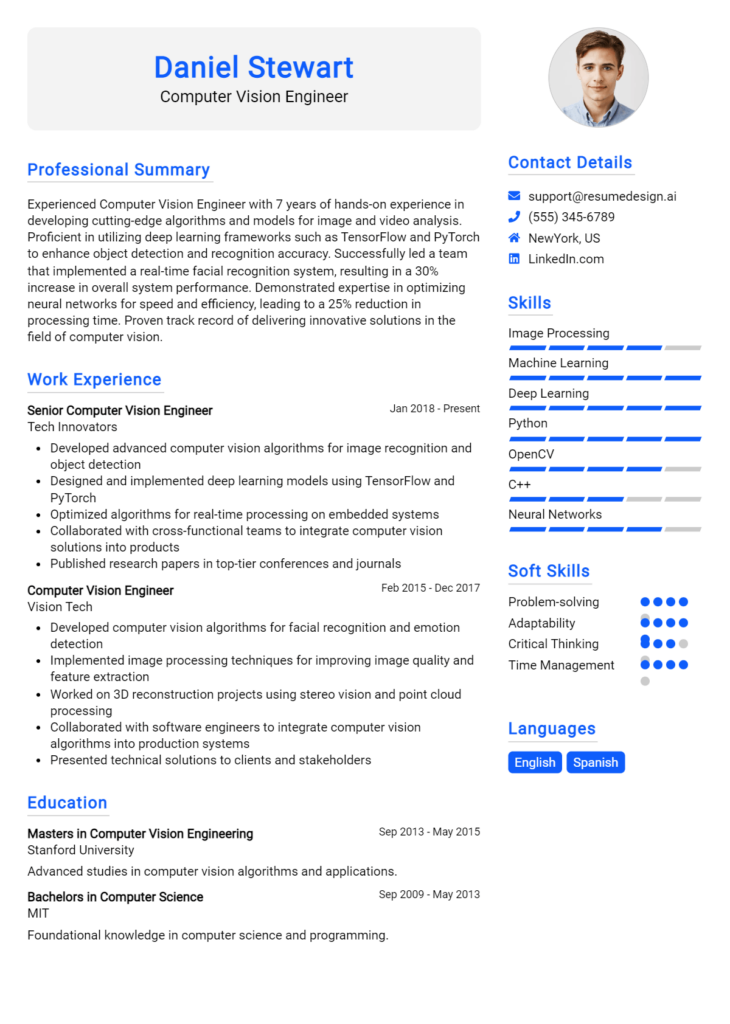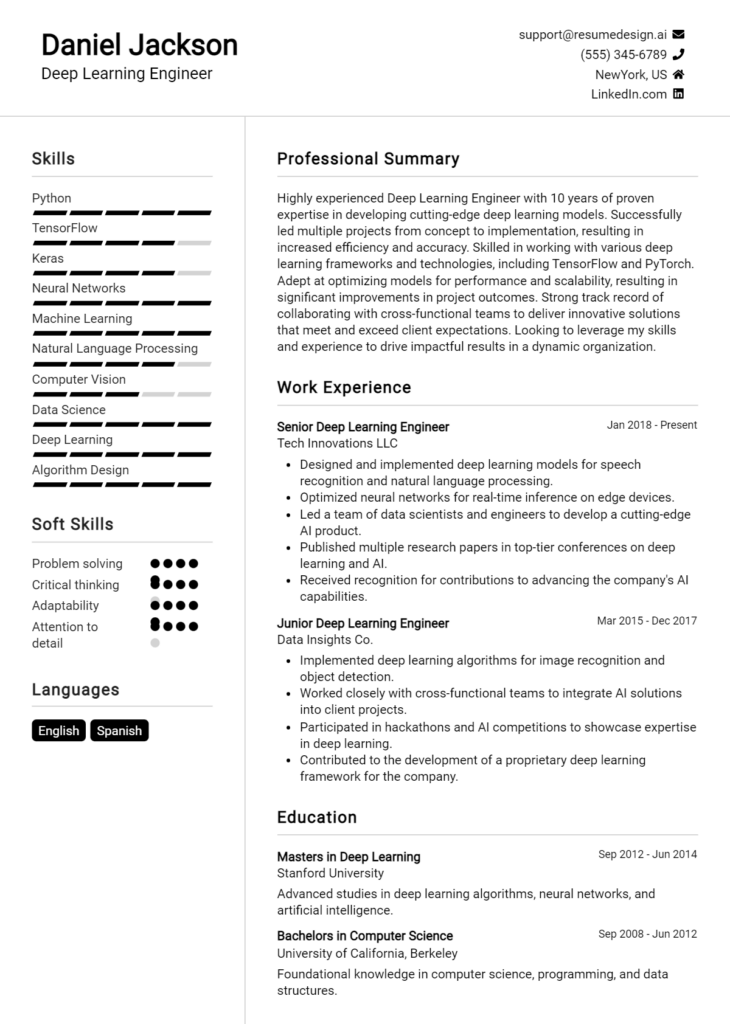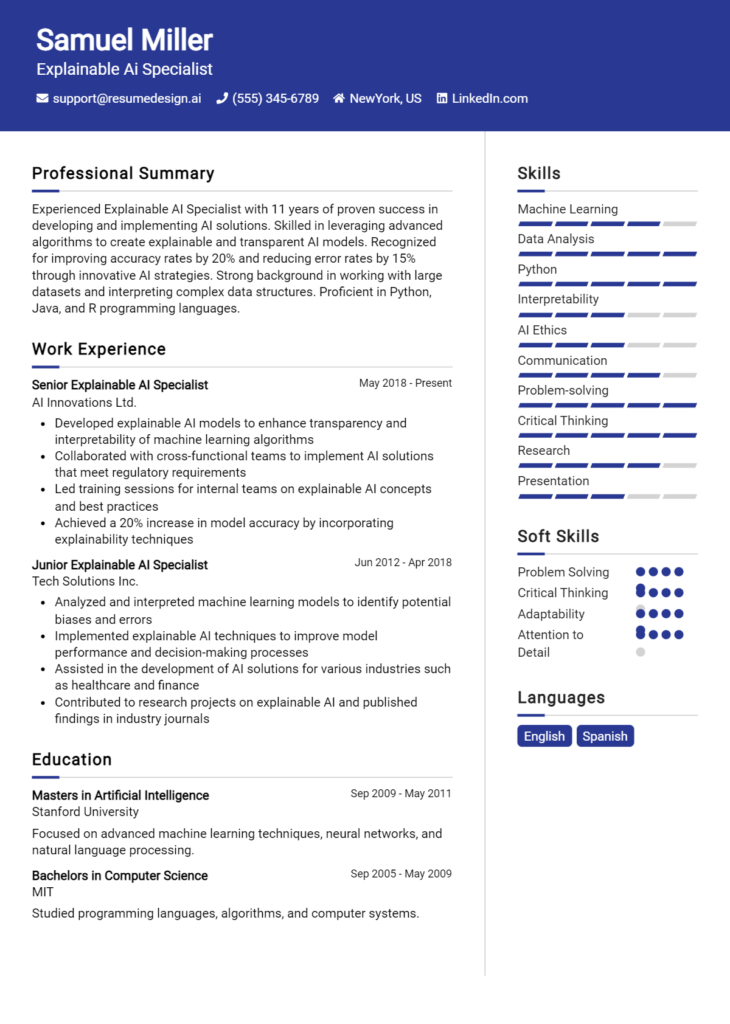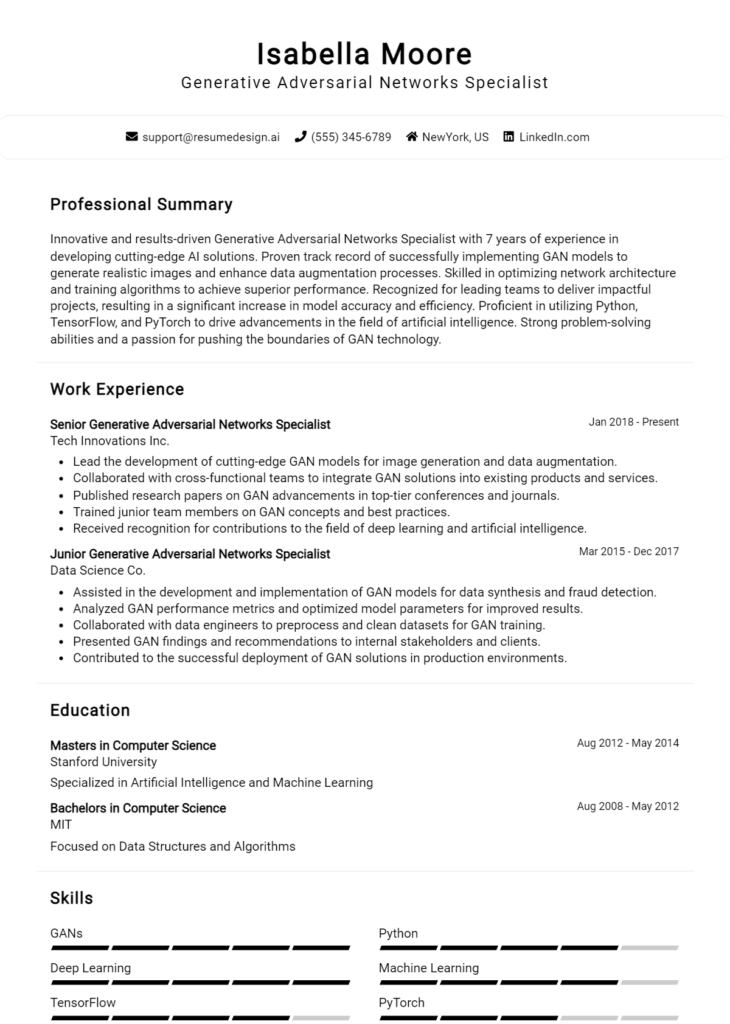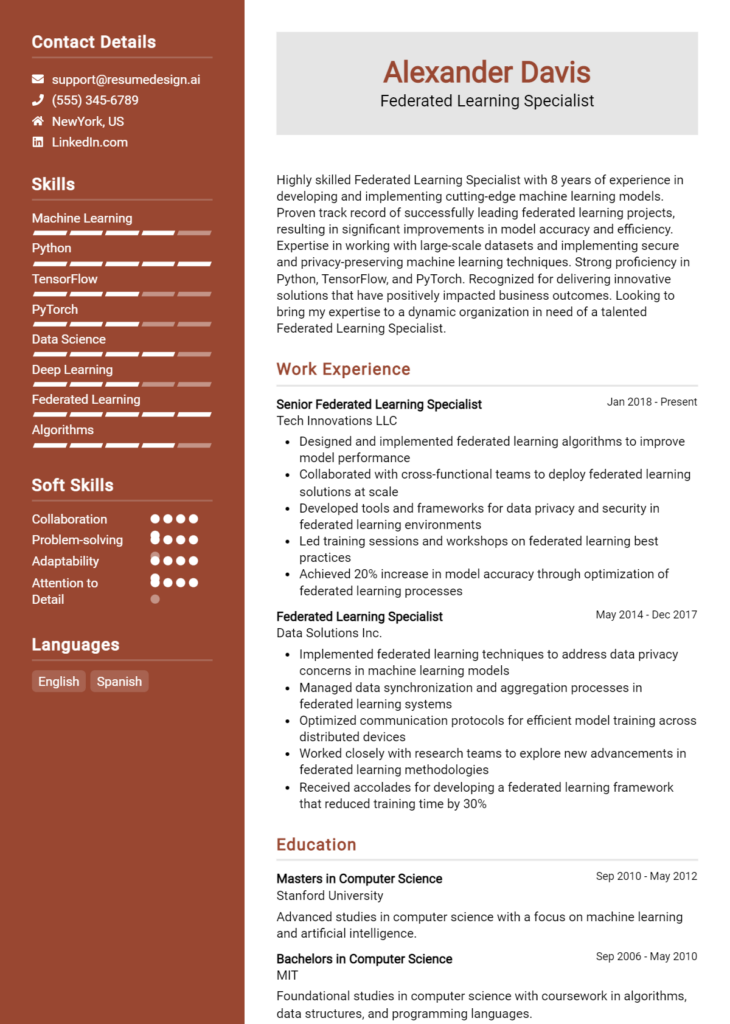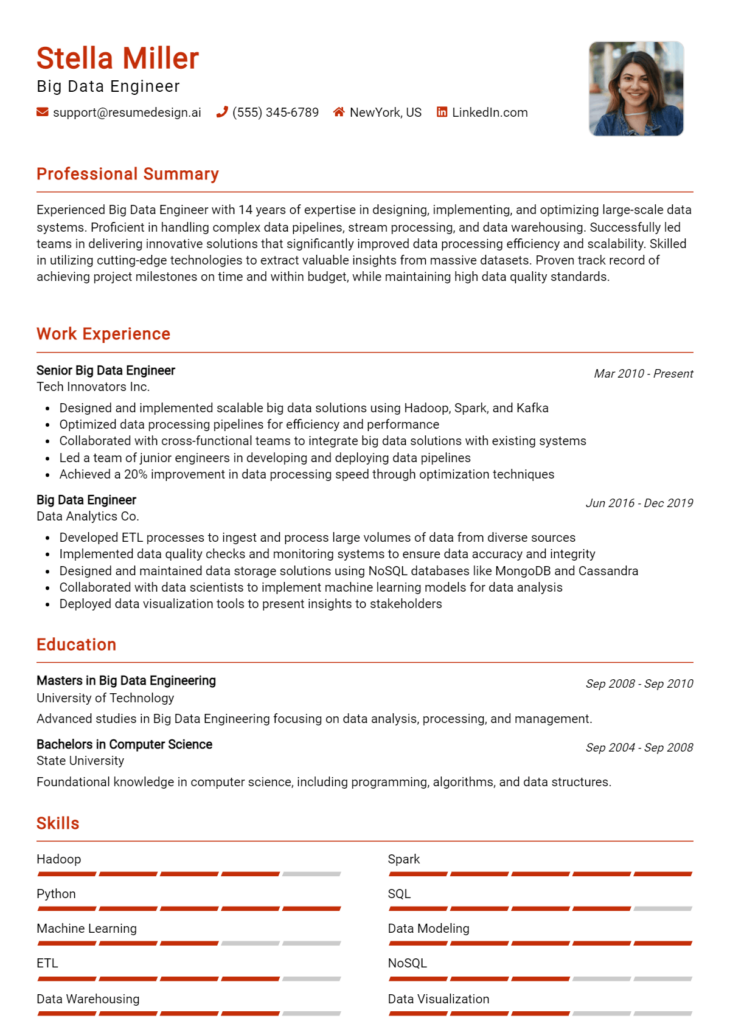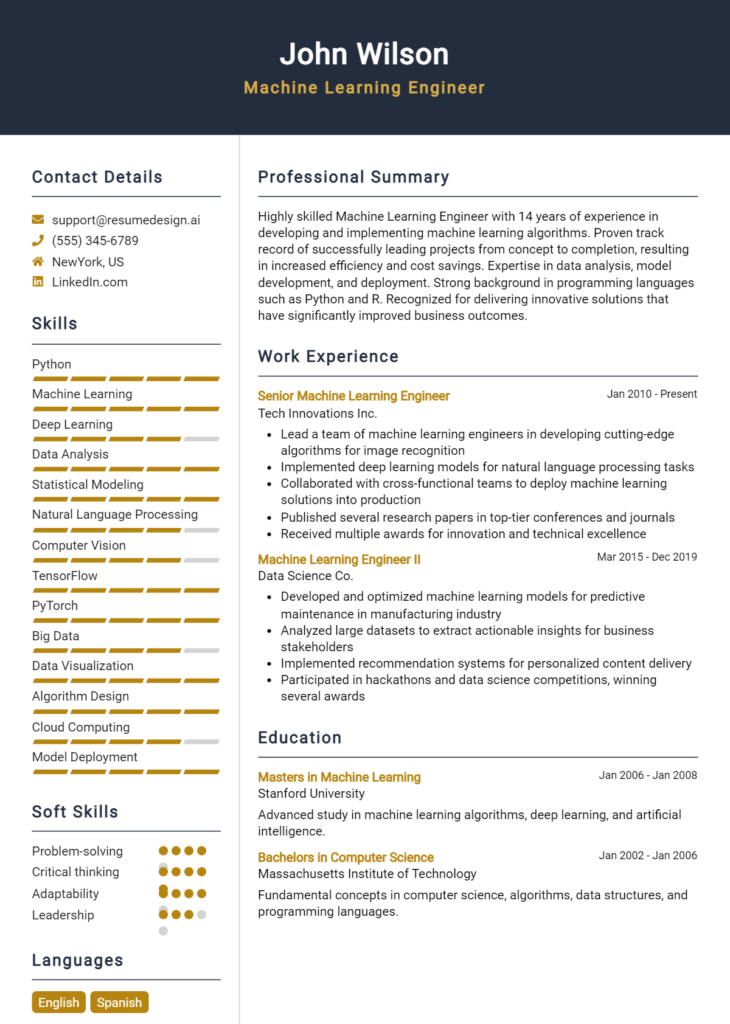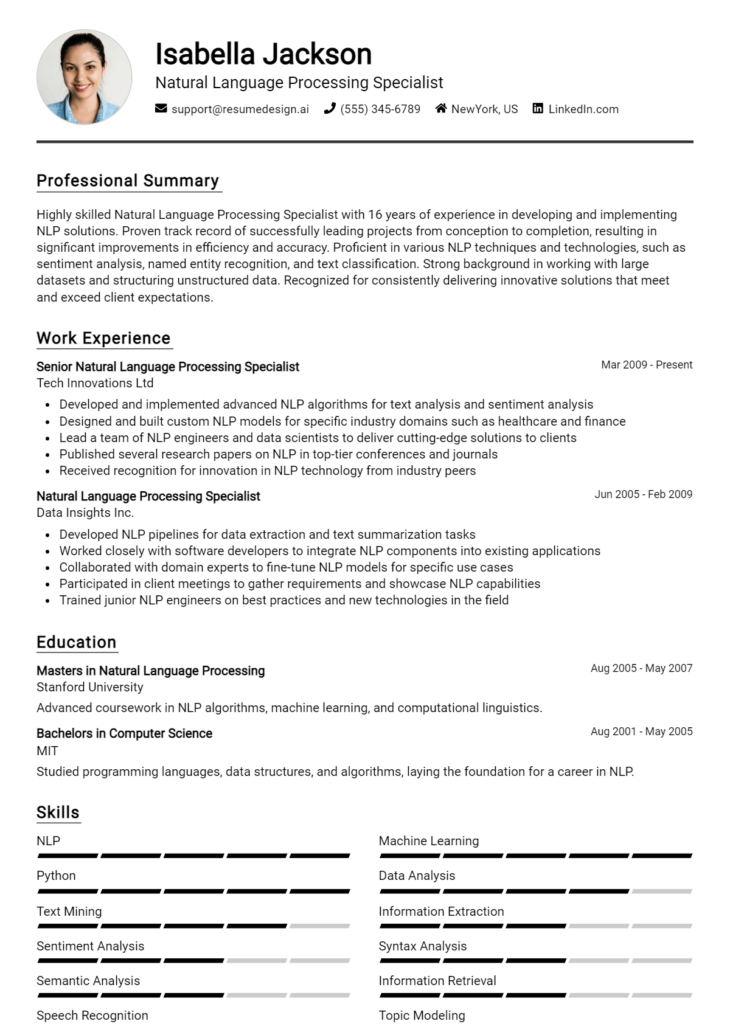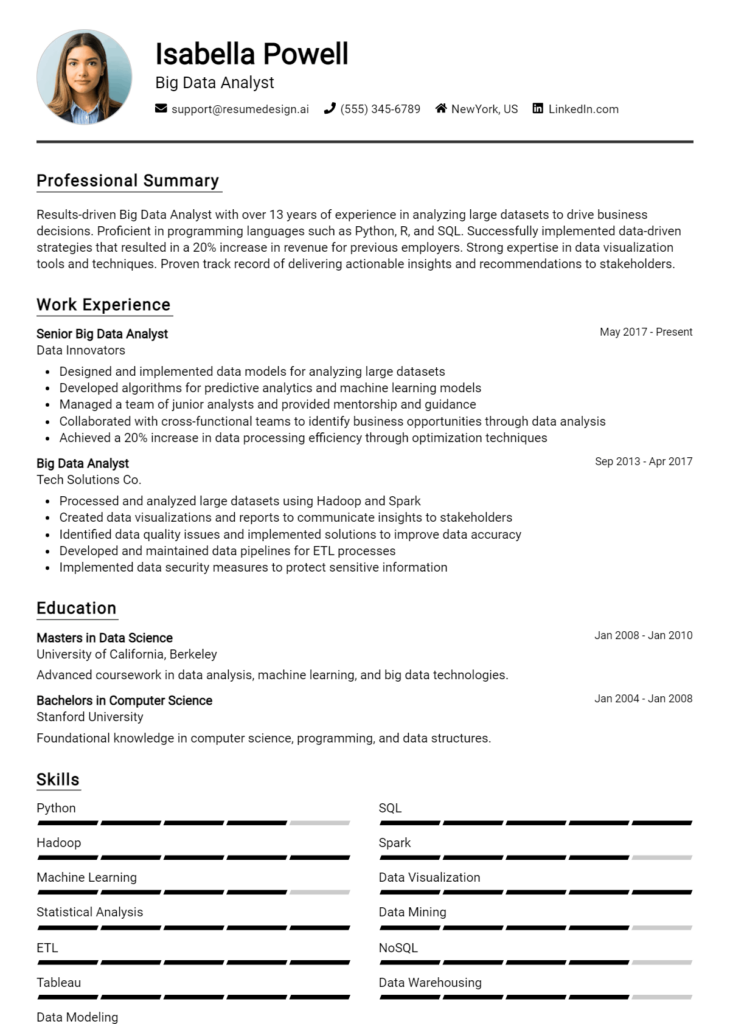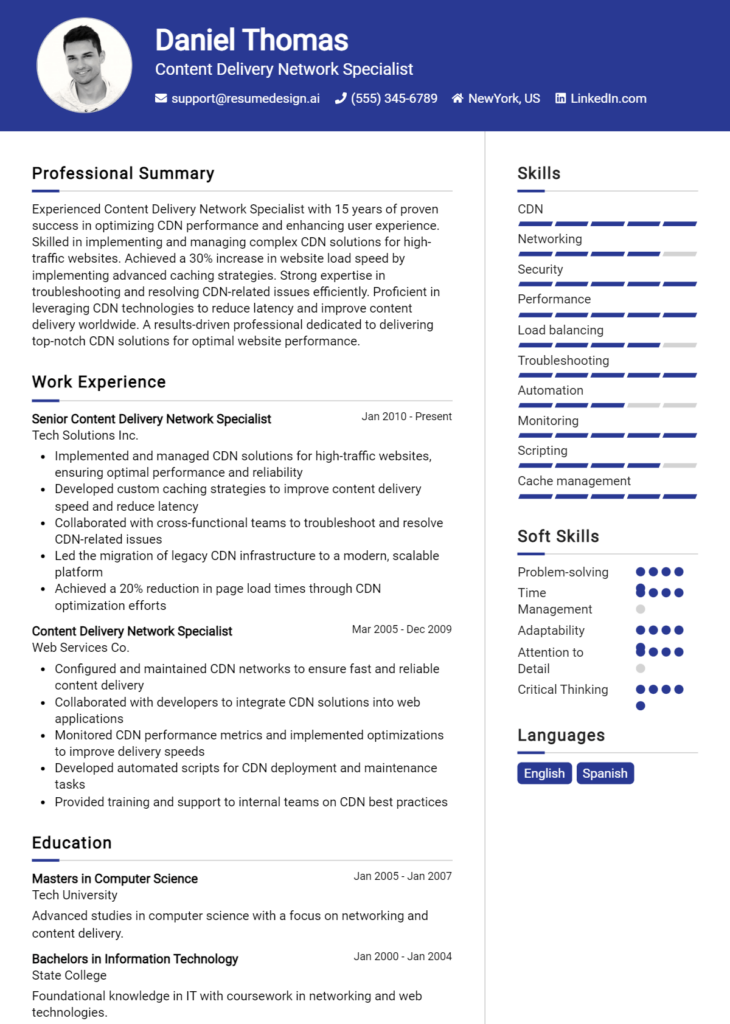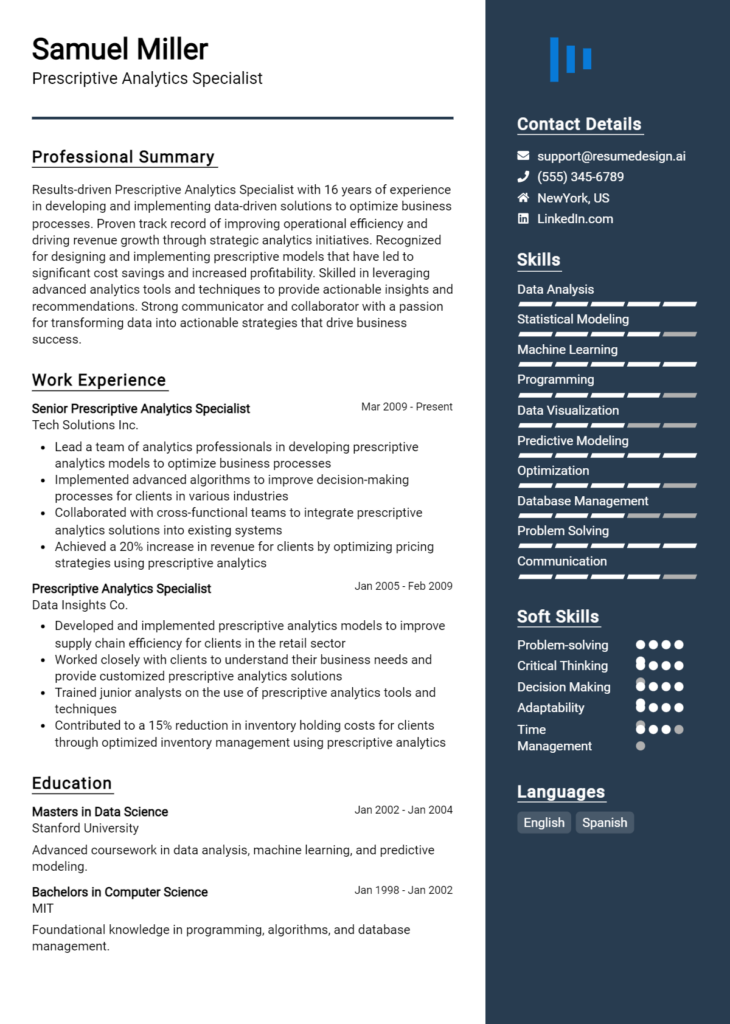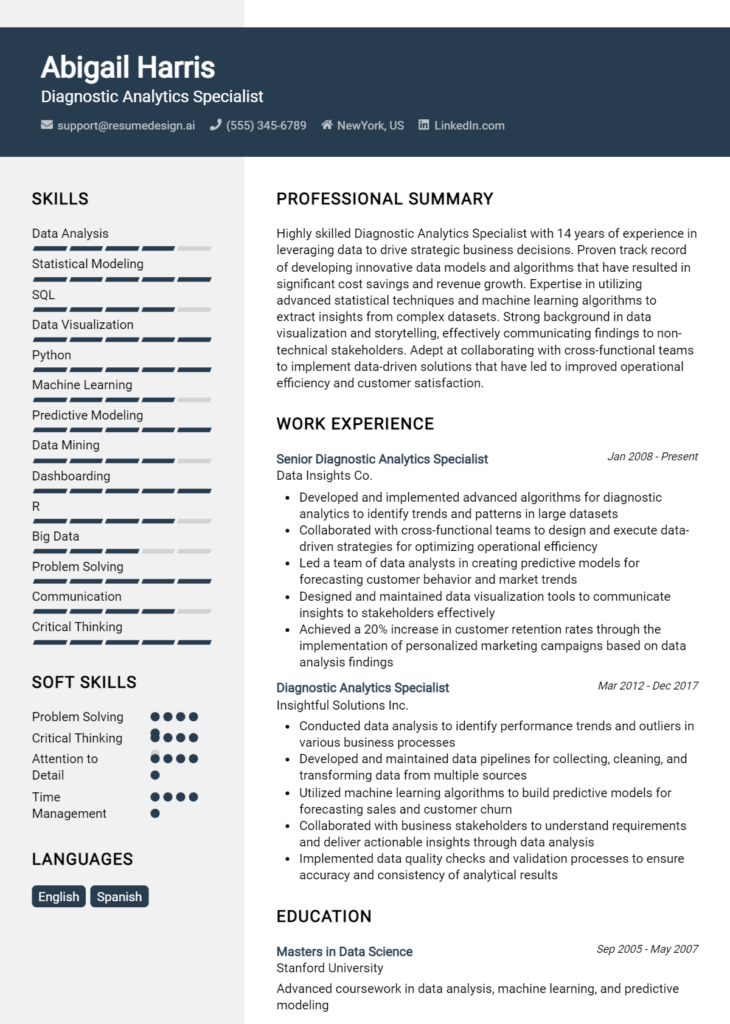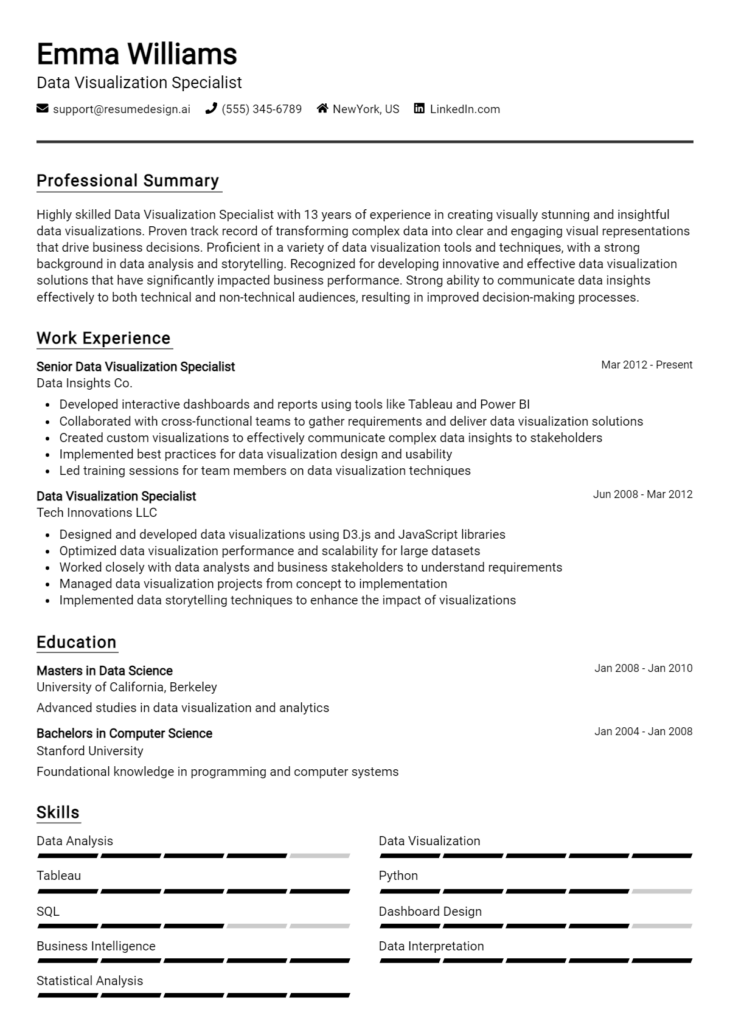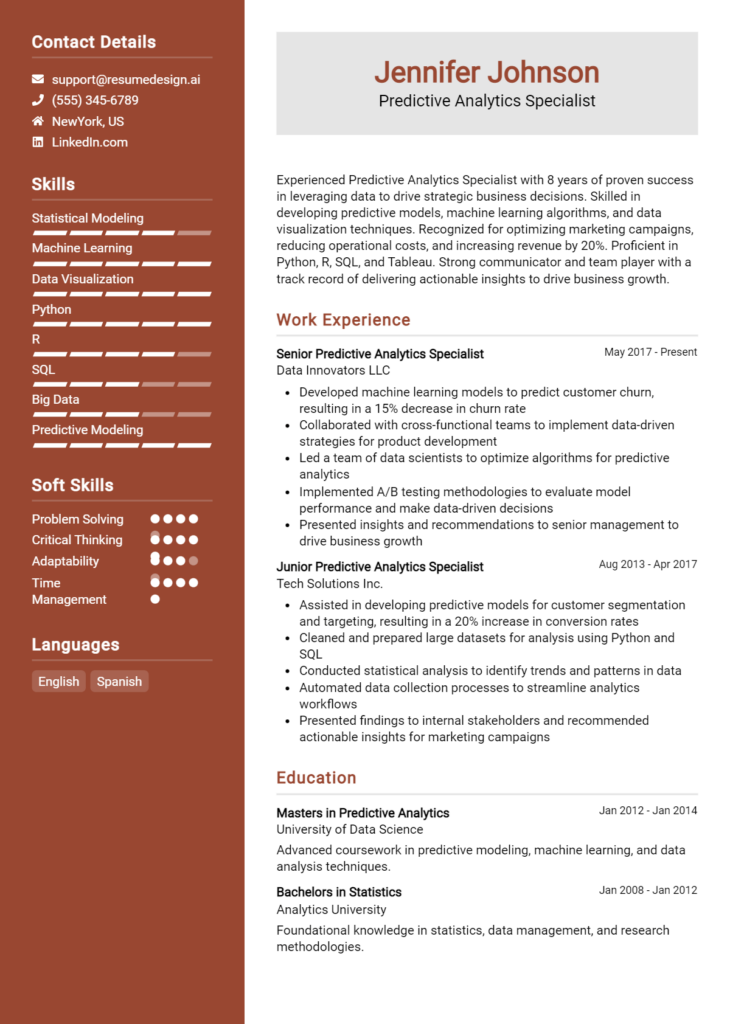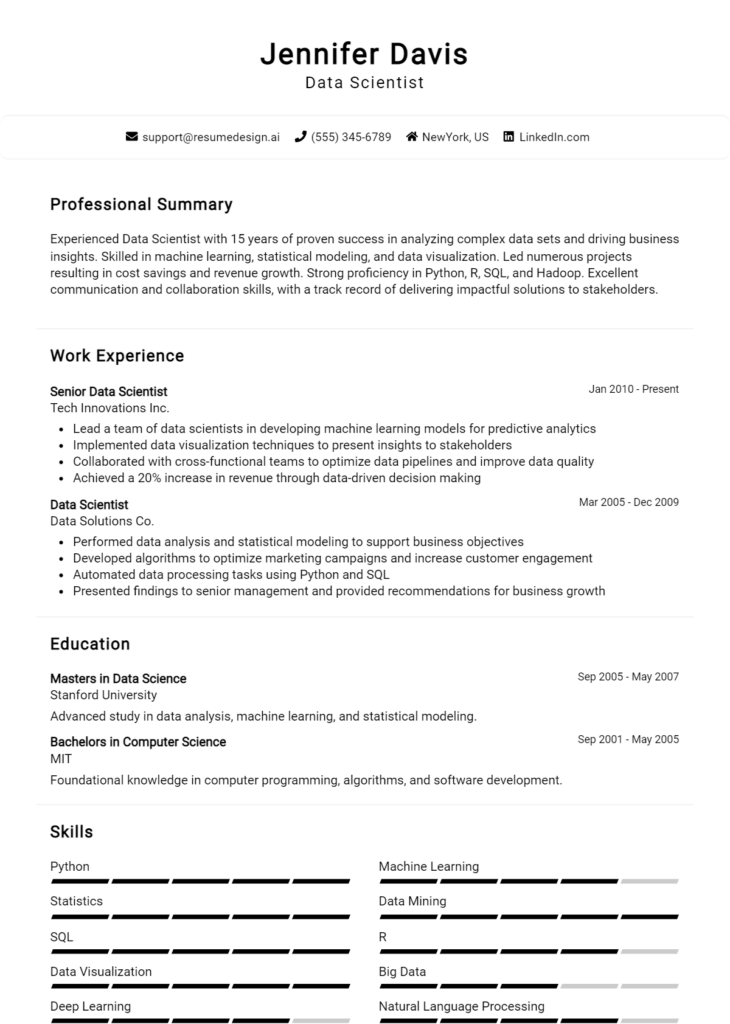Descriptive Analytics Specialist Core Responsibilities
A Descriptive Analytics Specialist plays a crucial role in transforming raw data into actionable insights by utilizing statistical techniques and data visualization tools. Key responsibilities include analyzing historical data, generating reports, and collaborating with various departments to support strategic decision-making. Essential skills encompass strong analytical abilities, proficiency in data analysis software, and effective communication. These qualifications not only enhance operational efficiency but also align with the organization’s objectives, making a well-structured resume vital for showcasing expertise and career potential.
Common Responsibilities Listed on Descriptive Analytics Specialist Resume
- Collecting and preprocessing large datasets for analysis.
- Applying statistical methods to identify trends and patterns.
- Creating data visualizations to communicate findings effectively.
- Collaborating with cross-functional teams to define analytics needs.
- Developing and maintaining dashboards and performance metrics.
- Documenting analytical processes and methodologies.
- Providing insights to support business strategies and initiatives.
- Conducting exploratory data analysis to uncover opportunities.
- Assisting in the identification of key performance indicators (KPIs).
- Ensuring data integrity and accuracy in reporting.
- Staying updated with industry trends and best practices in analytics.
High-Level Resume Tips for Descriptive Analytics Specialist Professionals
In the competitive field of descriptive analytics, a well-crafted resume is essential for making a strong first impression on potential employers. Your resume serves as your personal marketing tool, showcasing not just your skills but also your achievements in a way that sets you apart from other candidates. It is crucial that your resume reflects your unique qualifications, particularly tailored to the descriptive analytics field, where data interpretation and communication are key. This guide aims to provide practical and actionable resume tips specifically designed for Descriptive Analytics Specialist professionals, helping you to effectively present your expertise and secure that coveted interview.
Top Resume Tips for Descriptive Analytics Specialist Professionals
- Tailor your resume to match the specific job description, using keywords and phrases that align with the role.
- Highlight relevant experience in data analysis, visualization, and interpretation to demonstrate your capabilities.
- Quantify your achievements by including metrics that showcase your impact, such as improved reporting accuracy or increased efficiency.
- Emphasize industry-specific skills such as statistical analysis, data mining, and proficiency in analytical tools like SQL, R, or Python.
- Include a dedicated section for technical skills, ensuring that it stands out for easy visibility to hiring managers.
- Showcase your ability to communicate complex data insights clearly to stakeholders, as this is a critical skill for a Descriptive Analytics Specialist.
- Utilize a clean and professional format, making it easy for recruiters to scan and find key information quickly.
- Incorporate relevant certifications or ongoing education that demonstrates your commitment to staying current in the analytics field.
- Consider adding a summary statement at the top of your resume that encapsulates your core skills and professional goals.
- Proofread your resume meticulously to eliminate any errors or inconsistencies that could detract from your professionalism.
By implementing these tips, you can significantly enhance your resume and increase your chances of landing a job in the Descriptive Analytics Specialist field. A polished and targeted resume will not only highlight your qualifications but also demonstrate your understanding of the industry, making you a more appealing candidate to potential employers.
Why Resume Headlines & Titles are Important for Descriptive Analytics Specialist
In the competitive landscape of the job market, a Descriptive Analytics Specialist must present their qualifications effectively to stand out among numerous candidates. Resume headlines and titles play a crucial role in this endeavor, serving as the first point of contact between the applicant and the hiring manager. A strong headline can immediately capture attention, summarizing a candidate’s key qualifications and core competencies in one impactful phrase. It is essential that these headlines are concise, relevant, and directly related to the specific job being applied for, as they set the tone for the rest of the resume and can significantly influence the hiring manager's decision-making process.
Best Practices for Crafting Resume Headlines for Descriptive Analytics Specialist
- Keep it concise—aim for one impactful phrase.
- Use industry-specific keywords relevant to descriptive analytics.
- Highlight your most relevant skills and achievements.
- Customize the headline for each job application.
- Avoid jargon or overly complex language.
- Focus on measurable outcomes where possible.
- Make it attention-grabbing and memorable.
- Include your years of experience if applicable.
Example Resume Headlines for Descriptive Analytics Specialist
Strong Resume Headlines
Data-Driven Descriptive Analytics Specialist with 5+ Years of Experience in Transforming Business Insights
Results-Oriented Analytics Professional Specializing in Data Visualization and Reporting
Experienced Descriptive Analyst Committed to Leveraging Data to Drive Strategic Decision-Making
Proficient Descriptive Analytics Specialist with Expertise in Statistical Analysis and Predictive Modeling
Weak Resume Headlines
Analytics Specialist
Data Professional Seeking Opportunities
Experienced in Analytics
The strong headlines are effective because they clearly articulate the candidate's unique value proposition, showcasing specific skills, years of experience, and focus areas within descriptive analytics. They not only convey professionalism but also align closely with the expectations of hiring managers looking for targeted expertise. In contrast, the weak headlines fail to impress due to their vagueness and lack of specificity, leaving hiring managers with little insight into the candidate's qualifications or potential contributions to the organization.
Writing an Exceptional Descriptive Analytics Specialist Resume Summary
A resume summary is a crucial component for a Descriptive Analytics Specialist, as it serves as the first impression a hiring manager receives from your application. A strong summary quickly captures attention by succinctly showcasing your key skills, relevant experience, and professional accomplishments that align with the job role. By being concise yet impactful, a well-crafted summary effectively highlights what makes you a suitable candidate, increasing the likelihood of advancing in the hiring process. Tailoring your summary to the specific job you are applying for further enhances its effectiveness, ensuring it resonates with the employer's needs.
Best Practices for Writing a Descriptive Analytics Specialist Resume Summary
- Quantify achievements: Use numbers and metrics to illustrate your impact in previous roles.
- Focus on relevant skills: Highlight the specific skills that match the job description.
- Tailor the summary: Customize your summary for each job application to reflect the specific requirements.
- Keep it concise: Aim for 3-5 sentences that effectively communicate your value.
- Use action verbs: Start sentences with dynamic verbs to convey a sense of accomplishment.
- Highlight industry knowledge: Mention tools, technologies, or methodologies relevant to descriptive analytics.
- Showcase problem-solving abilities: Emphasize how you have used data to drive decisions or solve business problems.
- Include certifications or education: Mention relevant certifications or degrees that enhance your qualifications.
Example Descriptive Analytics Specialist Resume Summaries
Strong Resume Summaries
Detail-oriented Descriptive Analytics Specialist with over 5 years of experience in transforming complex data sets into actionable insights. Successfully increased operational efficiency by 30% through data-driven process improvements in a retail environment.
Results-driven analyst with expertise in SQL and Tableau, delivering key business insights that drove a 25% increase in customer retention rates. Proven track record of using statistical analysis to inform strategic decisions.
Accomplished Descriptive Analytics Specialist skilled in data visualization and predictive modeling, achieving a 40% reduction in churn rates through targeted marketing analytics. Strong background in machine learning applications for business intelligence.
Weak Resume Summaries
Experienced analyst looking for opportunities in data analysis. I have some skills in data interpretation.
Data specialist with a background in analytics. Interested in using my skills in a new role.
The examples of strong resume summaries are considered effective because they provide specific achievements, quantify results, and align closely with the responsibilities of a Descriptive Analytics Specialist. In contrast, the weak resume summaries lack detail, specificity, and measurable outcomes, making it difficult for hiring managers to gauge the candidate's qualifications and potential impact in the role.
Work Experience Section for Descriptive Analytics Specialist Resume
The work experience section of a Descriptive Analytics Specialist resume is critical as it serves as a window into the candidate's technical skills and professional journey. This section not only highlights the specific analytical tools and methodologies the candidate is proficient in but also showcases their ability to lead teams and deliver high-quality insights that drive business decisions. By quantifying achievements and aligning experiences with industry standards, candidates can effectively demonstrate their value to potential employers, making it clear how their contributions can enhance organizational performance.
Best Practices for Descriptive Analytics Specialist Work Experience
- Utilize industry-specific terminology to demonstrate familiarity with analytical tools and practices.
- Quantify achievements with metrics, such as percentage improvements, revenue growth, or time saved.
- Highlight technical skills relevant to descriptive analytics, such as proficiency in SQL, Python, R, or data visualization tools.
- Showcase collaboration by mentioning cross-functional teams worked with and the outcomes of those collaborations.
- Use action verbs to convey a sense of proactivity and responsibility in previous roles.
- Tailor experiences to align with the specific job description, emphasizing relevant responsibilities and accomplishments.
- Include any leadership roles or mentorship experiences to illustrate your ability to guide and develop others.
- Provide context for projects undertaken to highlight the impact of your work on the organization as a whole.
Example Work Experiences for Descriptive Analytics Specialist
Strong Experiences
- Led a cross-functional team of 5 analysts to develop a predictive model that improved customer retention by 20%, resulting in a $1M increase in annual revenue.
- Implemented a data visualization dashboard using Tableau that reduced reporting time by 30%, enabling the marketing team to make informed decisions faster.
- Conducted a comprehensive analysis of customer purchase patterns, which informed a new product strategy and increased sales by 15% year-over-year.
- Managed the integration of a new analytics software, training 10 team members and enhancing data reporting capabilities by 40% within six months.
Weak Experiences
- Worked on various data analysis projects that were somewhat helpful.
- Assisted in team meetings where analytics were discussed.
- Used some software tools for reporting tasks occasionally.
- Contributed to reports and presentations but did not lead any initiatives.
The examples are considered strong because they showcase quantifiable outcomes, such as increased revenue and reduced reporting times, which clearly demonstrate the candidate's impact on the organization. They also highlight leadership and collaboration, indicating the ability to work effectively within a team. In contrast, the weak experiences lack specificity and measurable results, making them less impressive and failing to convey the candidate's true capabilities or contributions to their previous roles.
Education and Certifications Section for Descriptive Analytics Specialist Resume
The education and certifications section of a Descriptive Analytics Specialist resume is crucial for establishing the candidate's foundational knowledge and expertise in data analysis. This section serves to showcase the academic background that supports the candidate's analytical skills, as well as any industry-relevant certifications that demonstrate a commitment to professional development and mastery of essential tools and methodologies. By detailing relevant coursework, specialized training, and recognized credentials, candidates can significantly enhance their credibility and better align themselves with the specific requirements of the job role, ultimately making a stronger impression on potential employers.
Best Practices for Descriptive Analytics Specialist Education and Certifications
- Prioritize degrees in data science, statistics, computer science, or related fields.
- Include industry-recognized certifications such as Certified Analytics Professional (CAP) or Microsoft Certified: Data Analyst Associate.
- Highlight relevant coursework that pertains to data analysis, statistics, or machine learning.
- Specify the institution, degree type, and graduation date for each educational entry.
- Ensure certifications are up-to-date, particularly in rapidly evolving fields like analytics.
- Use clear formatting to make it easy for employers to scan through your educational achievements.
- Consider including online courses or workshops from reputable platforms that are relevant to analytics.
- Tailor the education and certifications section to match the job description and required qualifications.
Example Education and Certifications for Descriptive Analytics Specialist
Strong Examples
- Bachelor of Science in Data Science, University of XYZ, Graduated May 2021
- Certified Analytics Professional (CAP), Issued February 2022
- Advanced Data Analysis Techniques, Coursera, Completed July 2023
- Master of Science in Statistics, University of ABC, Expected Graduation December 2024
Weak Examples
- Bachelor of Arts in English Literature, University of LMN, Graduated May 2015
- Certification in Basic Computer Skills, Issued January 2010
- General Business Course, Community College of OPQ, Completed June 2018
- Outdated Microsoft Office Specialist, Issued September 2019
The strong examples are considered effective because they directly relate to the skills and knowledge necessary for a Descriptive Analytics Specialist, showcasing up-to-date and relevant qualifications. In contrast, the weak examples lack relevance to the field of analytics and do not demonstrate the necessary analytical skills or specialized knowledge, making them less impactful for potential employers seeking qualified candidates.
Top Skills & Keywords for Descriptive Analytics Specialist Resume
In the fast-evolving field of data analytics, a Descriptive Analytics Specialist plays a pivotal role in transforming raw data into meaningful insights that drive business decisions. A well-crafted resume for this position must effectively highlight both hard and soft skills, as they are crucial in demonstrating the candidate's capability to analyze data patterns and communicate findings effectively. Employers often seek professionals who not only possess technical proficiency but also exhibit strong interpersonal skills, enabling them to collaborate with cross-functional teams. By showcasing the right blend of skills and relevant work experience, candidates can significantly enhance their chances of standing out in a competitive job market.
Top Hard & Soft Skills for Descriptive Analytics Specialist
Soft Skills
- Effective communication
- Critical thinking
- Problem-solving
- Attention to detail
- Team collaboration
- Adaptability
- Time management
- Creativity
- Interpersonal skills
- Presentation skills
Hard Skills
- Data visualization tools (e.g., Tableau, Power BI)
- Statistical analysis
- SQL and database management
- Microsoft Excel (advanced functions)
- Data mining techniques
- Programming languages (e.g., Python, R)
- Business intelligence software
- Data cleaning and preprocessing
- Reporting tools
- Knowledge of data governance and compliance
Stand Out with a Winning Descriptive Analytics Specialist Cover Letter
As a passionate and detail-oriented Descriptive Analytics Specialist, I am excited to apply for the position at [Company Name]. With a strong background in data analysis and visualization, I have honed my skills in transforming complex datasets into actionable insights that drive strategic decision-making. My experience in using tools such as SQL, Python, and Tableau has equipped me with the technical expertise necessary to interpret historical data effectively and present findings that resonate with both technical and non-technical stakeholders.
In my previous role at [Previous Company Name], I successfully led a team responsible for analyzing customer behavior patterns, which resulted in a 20% increase in user engagement over six months. By leveraging descriptive statistics and creating visually compelling dashboards, I was able to communicate trends and anomalies clearly, enabling management to make informed marketing decisions. My ability to collaborate cross-functionally ensured that our insights were not only data-driven but also aligned with business objectives.
I am particularly drawn to the opportunity at [Company Name] due to your commitment to leveraging data for strategic growth. I am eager to bring my analytical skills and innovative mindset to your team, helping to uncover valuable insights that can enhance operational efficiencies and improve customer satisfaction. I am confident that my proactive approach and dedication to continuous learning will make a significant contribution to your analytics efforts.
Thank you for considering my application. I look forward to the possibility of discussing how my skills and experiences align with the goals of [Company Name]. I am excited about the opportunity to contribute to your team and help drive impactful data-driven decisions.
Common Mistakes to Avoid in a Descriptive Analytics Specialist Resume
Crafting a resume for a Descriptive Analytics Specialist can be challenging, as it requires a clear demonstration of both technical skills and analytical thinking. However, many candidates make common mistakes that can detract from their qualifications and make their resumes less effective. Avoiding these pitfalls is crucial for standing out in a competitive job market and ensuring that your skills and experience are presented in the best possible light.
Vague Job Descriptions: Failing to provide specific details about previous roles and responsibilities can leave hiring managers confused about your actual experience. Instead, use clear and quantifiable descriptions of your work.
Neglecting Technical Skills: Descriptive analytics relies heavily on technical skills such as data visualization and statistical analysis. Omitting key tools and technologies (e.g., SQL, Python, Tableau) can lead to missed opportunities.
Inconsistent Formatting: A cluttered or inconsistent resume can distract from your qualifications. Ensure uniformity in font, size, and spacing to create a professional appearance.
Using Jargon Without Explanation: While industry terminology is important, overusing jargon without context can alienate hiring managers. Provide explanations or examples of how you applied specific terms in your work.
Lack of Results: Failing to highlight the impact of your work diminishes your accomplishments. Use metrics and specific outcomes to illustrate how your analyses led to business improvements or informed decision-making.
Overloading with Information: Including excessive details can overwhelm the reader. Focus on relevant experience and skills that directly relate to the job you are applying for, keeping your resume concise.
Ignoring Keywords: Many companies use Applicant Tracking Systems (ATS) to screen resumes. Neglecting to incorporate relevant keywords from the job description can result in your resume being overlooked.
Submitting a Generic Resume: Using the same resume for every application can be detrimental. Tailor your resume to highlight the skills and experiences that align specifically with the job requirements of each position you apply for.
Conclusion
In conclusion, the role of a Descriptive Analytics Specialist is pivotal in transforming raw data into actionable insights that can drive business decisions. Key responsibilities include analyzing historical data, identifying trends, and effectively communicating findings to stakeholders. A strong foundation in statistical analysis, data visualization, and proficiency with analytical tools are essential for success in this position.
As you reflect on your qualifications and experience, it’s an excellent time to review your Descriptive Analytics Specialist resume. Ensure it highlights your analytical skills and showcases your ability to derive meaningful insights from data. To assist you in this process, consider utilizing valuable resources such as resume templates, which can provide a solid structure for your resume. Additionally, a resume builder can streamline the creation process, allowing you to focus on the content rather than the design.
Moreover, examining resume examples can offer inspiration and help you understand how to effectively present your qualifications. Don’t forget the importance of a well-crafted cover letter; cover letter templates are also available to help you communicate your passion and fit for the role.
Take action today—revise your resume and cover letter to ensure they reflect your strengths as a Descriptive Analytics Specialist, and leverage these tools to give yourself the best chance at securing your next opportunity!

